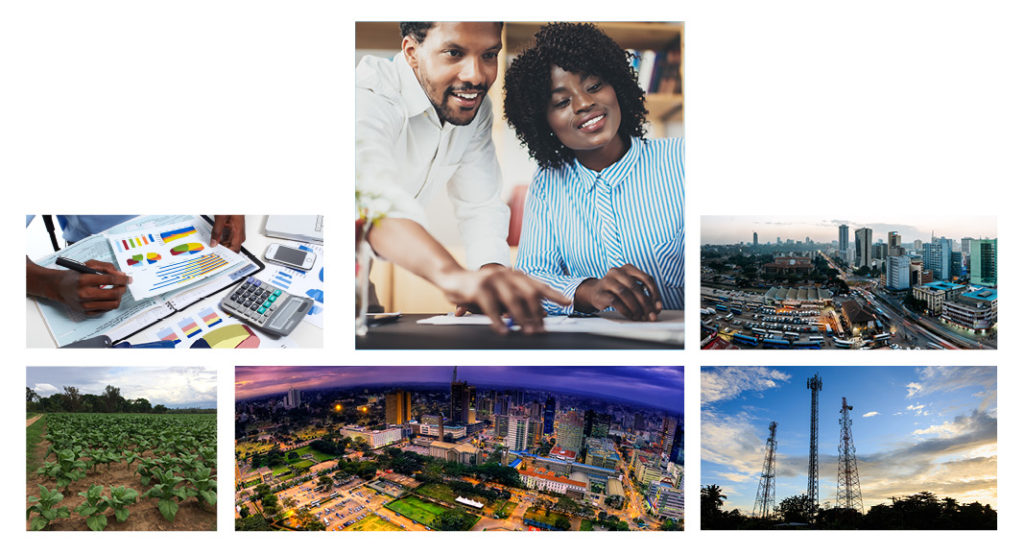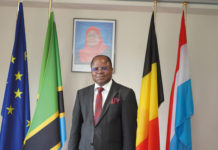Millennials dream about becoming one of them, businessmen and women talk about their business model… start-ups have changed the traditional method of development of businesses. Rapid and exponential growth, disruptive innovation, easy duplication process… In Africa, start-ups are inspiring many entrepreneurs and changing lives.
Agriculture
M-Farm
The focus of many African countries is set on developing agriculture through industrialisation and improving the production methods. Rightly so, as populations will continue to expand. Fortunately, Africa has great weather conditions and over 60 percent of the world’s unused arable land. According to the United Nation’s Africa’s agribusiness industry in expected to be worth $1 trillion by 2030. M-Farm in Kenya, as explained in our article on Tech Start-up Hubs, is a perfect example of how to create a better income for farmers.
![]() Website :
Website :
www.mfarm.co.ke
Farmerline, Amazon for farmers
Over half the active population of Ghana works in the agriculture sector. Without access to the right information, advice and resources, agriculture is difficult. Connecting farmers to the right information, markets and services to improve agriculture so that farmers have better income, that is the mission of the Founders of Farmerline. Collecting data and disseminating it through mobile technology (voice messages in local languages), the platforms send out good practices for farmers, weather reports and key information on market trends to over 200.000 farmers. Farmers can also map their parcels, manage their live-stocks and catalogue of products and pay the users through mobile money. The aim of the platform is to become an “Amazon for Farmers” on & offline where access to products & farmers is quick. The platform wants to contribute to decrease Africa’s dependence on international aid and invite the youth to embrace a new economic system. The King Baudouin African Development Prize was awarded to three start-ups, amongst which Farmerline, representing a prize of 75.000 euros. The company has attracted more than 4.4 million Ghana cedi (1 million USD) in overseas investment. The company’s growth is however largely driven by revenues from business clients. The next adventure is already set: getting to one million users by 2020.
![]() Website :
Website :
www.farmerline.co
Releaf, the digital industrial revolution
Connecting buyers to sellers of agricultural products to good customers in Nigeria -and establishing trust between them- is the mission of Relief. In the start of 2018, it counted some 600 active users, 100 connections and 600 companies on the platform. It was launched in August 2017 and raised $120.000 from the incubator YCombinator -based in Silicon Valley- thanks to its founders Isiah Udotong, Ikenna Nzewi and Uzoma Ayogu. With the platform now publicly available, Releaf hopes to on-board 20,000 businesses over the next 12 months.
![]() Website :
Website :
www.releaf.ng
Hello Tractor, the uber for tractors
In Nigeria, agriculture is still lacking the correct equipment’s to allow small farmers to be able to cultivate the land correctly. Hello Tractor, is an answer to that. This start-up offers a low cost, user friendly alternative to farmers who can’t afford to buy an engine but would still like to be able to cultivate their land correctly. The country’s federal government, which is the major supplier of tractors, can only meet four percent of their requirements. Africa has less than 50 agricultural tractors per 100 square kilometres of arable land, according to the Food and Agriculture Organisation. These micro-tractors have an affordable cost of $4.000 and a tailored-made solution for their financing. The engines are rented out through an app to farmers who can easily book them through an SMS and pay through their mobile. Once the rental period is finished, the payment is automatically transferred to the owner. The Nigerian government, through a public-private partnership, plans to bring 10.000 new Hello Tractor-equipped tractors to Nigeria over the next five years. The concept has now expanded to Kenya where a project-pilot has been launched in 2018.
![]() Website :
Website :
www.releaf.ng
Retail & Delivery
Sokowatch, supply chain through SMS
There are over 10 million informal shops across Africa that regularly face challenges getting their suppliers to deliver when they need it, in small quantities and with insufficient financial means to be able to sustain their commerce. Sokowatch brought a solution to that problem in 2013 by increasing the availability of everyday consumer goods by allowing the shops to place orders from different international suppliers at any time through SMS. The system then processes these orders and distributes them to the shops within 24 hours through it local delivery agents. The users of the platform save on transports costs and minimize lost sales which can, according to the platform, account for up to 20% of business cost. A partnership with major brands such as Unilever, Proctor & Gamble, METL Group and many others allows the start-up to offer this solid system. It has known a sky-racketing success, now already supplying over 5.000 shops in Nairobi. The service has been extended to Dar es Salaam and quickly hit 1.000 clients within the first three months. Future openings are foreseen in Mombasa, Kampala and Kigali. At the end of July 2018, Sokowatch announced the close of a 2 million USD seed round led by 4DX Ventures, with Village Global, Lynett Capital, Golden Palm Investments and Outlierz Ventures.
![]() Website :
Website :
www.sokowatch.com
Tupuca, the african deliveroo
The solution created by 4 millennials who founded the platform connecting costumers and restaurants in 2015 through their smartphone. The company has over 120 restaurants signed up and more than 30.000 users. Adding pharmaceutical delivery and groceries to their service, this start-up is now getting invitations from neighbours Congo and Mozambique to open franchises and replicate their business-model. Since its launch, two investors, US Businessman Rohit Daswani and a local restaurant owner, Pramod Asija invested 200.000 USD.
![]() Website :
Website :
www.www.tupuca.com
Energy
Access to energy remains an important challenge in the different African countries. While  access to electricity in urban areas is often more easy, rural areas more often face numerous challenges. Solar energy, nano-networks of electricity and solar lamps are amongst the most innovative start-ups changing daily life and mixing Fintech with energy systems.
access to electricity in urban areas is often more easy, rural areas more often face numerous challenges. Solar energy, nano-networks of electricity and solar lamps are amongst the most innovative start-ups changing daily life and mixing Fintech with energy systems.
M-Kopa, the mobile solar energy kit
Offering off-grid electricity solutions in Kenya to over 600.000 homes thanks to solar panels connected with a battery to provide electricity all day-long, M-KOPA is a true success-story in Kenya. Founded in 2011 by Nick Hughes, Chad Larson and Jesse-Moore, the start-up could benefit from their experience of setting up M-Pesa at Vodfone. Success came quick: by 2015, the company had made over 40 million dollars of revenue
The system is easy: customers pay a deposit of 35 USD to take the solar system home and pay a daily amount, approximatively 0,50 USD through the M-PESA money transfer app. After a year, the system is paid off and they own it, getting free electricity all day long. Thanks to this system, the dangerous use of kerosene lamps to light homes is slowly starting to be history. In February 2018, M-Kopa got 10 million USD in funding from FinDev Canada in a new funding round led by the shareholders and management. The product is sold in Kenya, Tanzania and Uganda.
![]() Website :
Website :
www.m-kopa.com
Services
Offering a solution to hire professionals you can trust, VConnect matches its customer needs with available suppliers. According to the company it can take up to five days to find a supplier and has over one million businesses logged, bringing that time down considerably. The way it works is easy, the users ask for a specific service, VConnect will consult its database and get the best quotes, presenting them to the user who can then choose between 3 suppliers. It was described by Forbes as one of the hottest tech start-ups of Africa.
Market by VConnect, a service marketplace where trusted business owners can find and connect with real customers, was launched on June 23, 2018. The service allows business owners to find and shop for customers with an option to pay for one customer or pay for a package plan. Simultaneously, “Take a Pledge” was introduced, a system to verify the identity of all businesses registered on Vconnect to promote trust and security.
VConnect has some solid partners to ensure a quality service. Truecaller, a global telephone directory with an integrated caller ID partnered up with the firm to integrate VConnect’s database. Mastercard has also partnered with VConnect to offer a mobile payment solution, increasing the ability to have fast, secure and cashless transactions.
![]() Website :
Website :
www.vconnect.com
![[:en]inspiring[:]](https://perspectives-cblacp.eu/wp-content/uploads/2018/09/inspiring-696x523.jpg)


